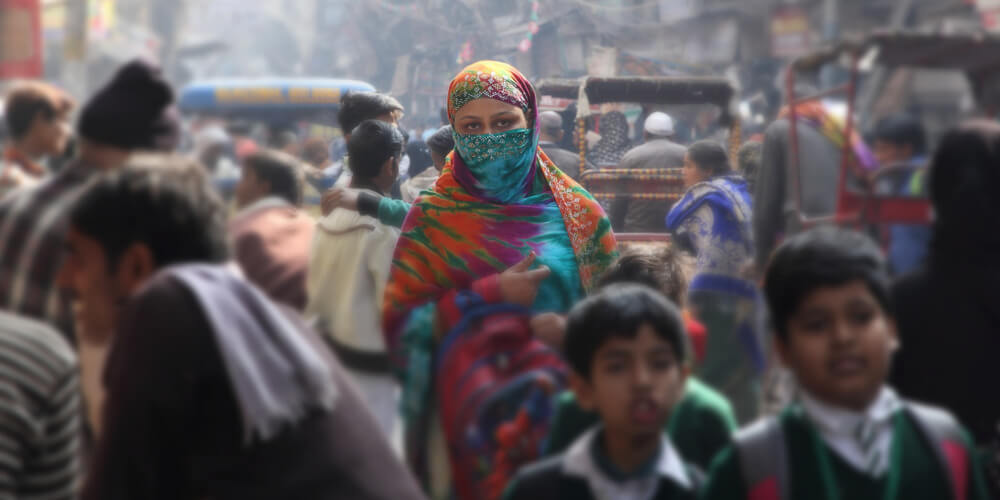Muslim women in India face huge job market discrimination
Study finds members of the community significantly underrepresented in workforce.
Mumbai: India has seen a marked decline in women’s participation in the labour force over the past two decades. However, Muslim women, who are significantly underrepresented in the working environment, are at a further disadvantage as they are singled out on the basis of religion. This is despite job market discrimination being unlawful and often against the belief systems companies espouse.
A study conducted over 10 months by the Indian-based Led By Foundation, in association with the Maulana Azad National Urdu University’s Centre for Development of Policy & Practice and the Centre for Development of Policy and Practice, has found huge bias against Muslim women across industries in entry-level jobs, even when they are similarly capable for the work.
The report Hiring Bias: Employment for Muslim women at entry-level roles pointed out the low work participation of Muslim women was an important reason why Muslims lag in employment figures relative to their population, with the proportion of Muslim women working within the home being 70% compared to the 51% national average for other communities.
Established in 2019 by Ruha Shadab, the Led By Foundation is a professional leadership incubator for Muslim women and aims to raise the representation of the country’s most disadvantaged women in the workforce. The report was authored by Shadab alongside Vanshika Sharan and Deepanjali Lahiri.
| Read the Q&A with Led By Foundation's Ruha Shadab - |
For the study, two equally qualified profiles were created matching the market standards for entry-level roles. The only variable was the names; Habiba Ali for the Muslim profile and Priyanka Sharma for the Hindu.
Over the research period 2,000 job applications were sent through 1,000 job postings on leading job search sites and the replies assembled to determine a net discrimination rate.
Recruiters were more cordial to Hindu candidate
The study found the Muslim candidate received only 103 positive responses, while the Hindu woman’s profile received 208, nearly double the number the similarly qualified Muslim woman received. The net discrimination rate stood at 47.1% across industries, based on the responses received.
Recruiters were also more cordial to the Hindu candidate as 41.3% of them connected with Priyanka over phone calls, while only 12.6% spoke with Habiba over a call, according to the report.
“The study pointed out that Muslim women, and women in general, are poorly represented in the labour force. Such a disparity demonstrates there is a direct bias against Indian Muslim women in the hiring process,” Shadab told Salaam Gateway.
She said Muslim women, by virtue of a lack of representation and historical marginalisation, were rarely seen as providers and competent workers. In their case, a general notion of women being incapable of working outside the home propounds with the negative stereotypes attached to being Muslim in India, said the report.
The study concludes a significant hiring bias exists against Muslim women even in instances where they are equally qualified and, according to Census 2011, Muslim women have the lowest work participation rate. Only 21.6% of Muslim women occupy regular jobs in urban areas compared to 40.4% and 60.7% for Hindu and Christian women respectively.
| Read -
|
No level playing field for Muslims
In its report, a high-level committee also indicated the Muslim community as a whole lagged the mainstream in social, economic and educational sectors and the presence of the community in government jobs was minimal.
The seven-member committee was appointed in March 2005 by then Prime Minister Manmohan Singh and was headed by former Chief Justice of Delhi High Court Rajinder Sachar. The report, submitted by the committee in 2006, highlighted the issue of Muslim Indian inequality, sparking an ongoing debate.
According to the report, the overall participation of Muslims in union government departments and agencies was “abysmally low at all levels”. There is not one state in which Muslim representation in government departments matched their population share.
The report noted Muslim employment in universities, banks and public sector undertakings was also low.
The Led By report says equal access to opportunities for Muslim women was vital to their social and financial equality in society and tackling biases in the hiring process was a key mechanism by which to level the playing field.
© SalaamGateway.com 2022. All Rights Reserved

Shuriah Niazi